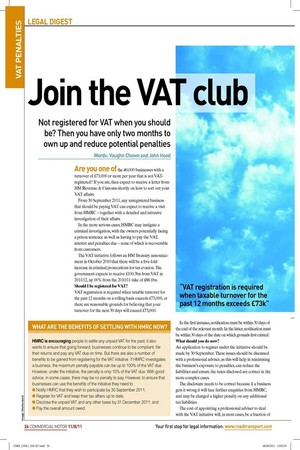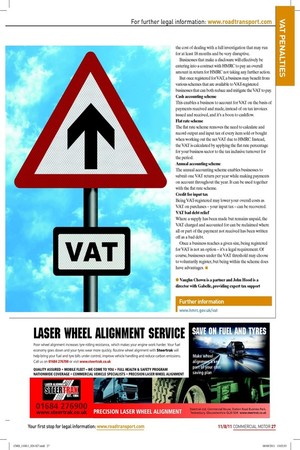Join the VAT club
Page 22

Page 23

If you've noticed an error in this article please click here to report it so we can fix it.
Not registered for VAT when you should be? Then you have only two months to own up and reduce potential penalties
Words: Vaughn Chown and John Hood Are you one of the 40,000 businesses with a turnover of £73,000 or more per year that is not VATregistered? If you are, then expect to receive a letter from HM Revenue & Customs shortly on how to sort out your VAT affairs.
From 30 September 2011, any unregistered business that should be paying VAT can expect to receive a visit from HMRC – together with a detailed and intrusive investigation of their affairs.
In the more serious cases, HMRC may instigate a criminal investigation, with the owners potentially facing a prison sentence as well as having to pay the VAT, interest and penalties due – none of which is recoverable from customers.
The VAT initiative follows an HM Treasury announcement in October 2010 that there will be a ive-fold increase in criminal prosecutions for tax evasion. The government expects to receive £100.3bn from VAT in 2011/12, up 16% from the 2010/11 take of £86.1bn. Should I be registered for VAT?
VAT registration is required when taxable turnover for the past 12 months on a rolling basis exceeds £73,000, or there are reasonable grounds for believing that your turnover for the next 30 days will exceed £73,000. In the irst instance, notiication must be within 30 days of the end of the relevant month. In the latter, notiication must be within 30 days of the date on which grounds irst existed. What should you do now?
An application to register under the initiative should be made by 30 September. These issues should be discussed with a professional adviser, as this will help in minimising the business’s exposure to penalties, can reduce the liabilities and ensure the taxes disclosed are correct in the more complex cases.
The disclosure needs to be correct because if a business gets it wrong it will face further enquiries from HMRC, and may be charged a higher penalty on any additional tax liabilities.
The cost of appointing a professional adviser to deal with the VAT initiative will, in most cases, be a fraction of the cost of dealing with a full investigation that may run for at least 18 months and be very disruptive.
Businesses that make a disclosure will effectively be entering into a contract with HMRC to pay an overall amount in return for HMRC not taking any further action.
But once registered for VAT, a business may beneit from various schemes that are available to VAT-registered businesses that can both reduce and mitigate the VAT to pay. Cash accounting scheme This enables a business to account for VAT on the basis of payments received and made, instead of on tax invoices issued and received, and it’s a boon to cashlow. Flat rate scheme The lat rate scheme removes the need to calculate and record output and input tax of every item sold or bought when working out the net VAT due to HMRC. Instead, the VAT is calculated by applying the lat rate percentage for your business sector to the tax inclusive turnover for the period.
Annual accounting scheme The annual accounting scheme enables businesses to submit one VAT return per year while making payments on account throughout the year. It can be used together with the lat rate scheme.
Credit for input tax Being VAT-registered may lower your overall costs as VAT on purchases – your input tax – can be recovered. VAT bad debt relief Where a supply has been made but remains unpaid, the VAT charged and accounted for can be reclaimed where all or part of the payment not received has been written off as a bad debt.
Once a business reaches a given size, being registered for VAT is not an option – it’s a legal requirement. Of course, businesses under the VAT threshold may choose to voluntarily register, but being within the scheme does have advantages. n l Vaughn Chown is a partner and John Hood is a director with Gabelle, providing expert tax support
Further information
www.hmrc.gov.uk/vat














































